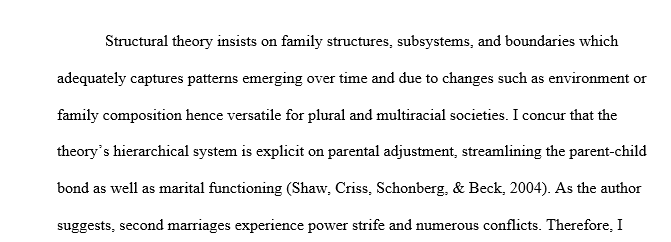Family structural theory
The family structural theory was first proposed by Salvadore Minuchin. The theory’s greatest appeal is that it uses already delineated systems like hierarchical arrangements, setting of boundaries and formulation of coalitions to solve everyday problems which are present in a family. (Goldberg & Goldberg, 2013). The family structural theory believes that each family unit is unique. That explains why of all family theories it has been the most consistent and useful especially in plural and multicultural societies. (McAdams et al, 2016, Updegraff, Madden-Derdich & Estrada, 2002). A fortiori, the arrangement of the family system into a hierarchical system which places parents above the children, creates a corresponding bond and sets boundaries for acceptable behavior within that bond becomes very significant. In fact, in many situations, dysfunctional behavior on the part of children are traceable to a collapse of that bond. (Updegraff, Madden-Derdich & Estrada, 2002)
The traditional concept of a family being made up of a man, his wife and their biological children has been overtaken by modernity-inspired shifts in paradigm, philosophy and reality. (McAdams et al, 2016) This student strongly believes that this previously unanticipated metamorphosis of the family system was occasioned by factors like immigration, divorce, biracial affinities, pre-marital pregnancies and same sex marriages, to mention just a few. The result is that even though each family has always been unique, the uniqueness of the family system in multi-ethnic, multi-racial and multi-cultural societies has become more enhanced.
Second marriages have become common place not just in the United States but all over the world. In fact, the emotional stress caused by second marriages has become a prominent health concern. This is because most second marriages begin with a lot of ‘steps’- stepfather, stepmother, stepson, stepdaughter, etc. (Mernitz & Kamp, 2016). These newly created alliances, relationships and coalitions in most instances, exist between individuals who hitherto, may have been strangers to one another. Conflicts, power and emotional struggles become almost inevitable. This student believes that the family structural theory may prove a useful resource for families created from second marriages. The rationale is that families can use the theory as a springboard to create bonds while setting limits and boundaries for what constitutes acceptable behavior. By doing this, stepchildren will understand that stepparents are in loco parentis over them and vice versa. More importantly, setting boundaries using the family structural theory would enable previous spouses understand that there has been a drastic change in rules and roles such that they are no longer in control of their relationships with their former partners.
In multicultural, multiracial and same sex marriages the dynamics are understandably more complex. Such unions align families and individuals from divergent backgrounds with attendant conflict-oriented consequences. The family structural theory can also be useful in such situations because it has proved very effective in diverse societies. (McAdams et al, 2016).
This student is of the opinion that with increasing modernity, multiracial, multicultural, same sex and second marriages have come to stay. Such marriages lead to the formation of new alliances which in turn breed conflict. The family structural theory is a useful tool to create boundaries, set hierarchies and form bonds which can reduce family dysfunction to the barest minimum.
References
Goldenberg, H., & Goldenberg, I. (2013). Family therapy: An overview. Belmont, CA: Brooks/Cole, 225.
Mernitz, S. E., & Kamp Dush, C. (2016). Emotional health across the transition to first and second unions among emerging adults. Journal of Family Psychology, 30(2), 233-244.
McAdams, C., Avadhanam, R., Foster, V., Harris
Solution preview for the order on Family structural theory
APA
190 words
